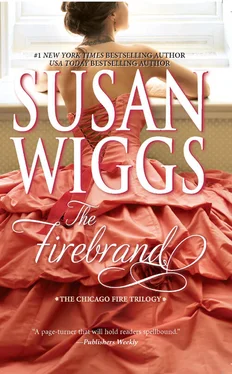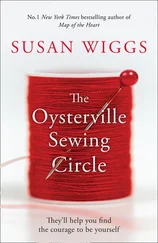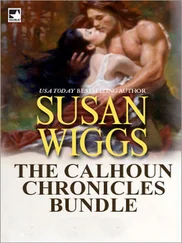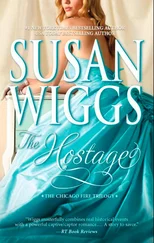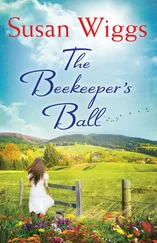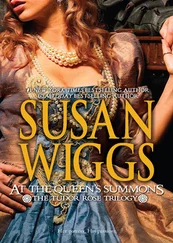Everything had fallen into place after that epiphany. In the fast-recovering city, Lucy had taken a bank loan, leased a shop in Gantry Street, occupied the small apartment above it and hung out her tradesman’s shingle: The Firebrand—L. Hathaway, Bookseller.
Running a bookshop hadn’t made her a wealthy woman, not in the financial sense, anyway. But the independence it afforded, and the knowledge that she purveyed books that made a difference in people’s lives, brought her more fulfillment than a railroad fortune.
The trouble was, one could not dine upon spiritual satisfaction. One could not clothe one’s fast-growing daughter with moral righteousness. Not during a Chicago winter, anyway.
Silky, the calico cat they had adopted a few years back, slunk into the room, sniffing the air in queenly fashion. Maggie jumped down from Lucy’s lap and stroked the cat, which showed great tolerance for the little girl’s zealous attentions.
“Run along, then,” she said, kissing the top of Maggie’s head. “Tell Grammy Vi that I’ve gone down to the shop.”
“And bicycles later,” Maggie reminded her.
“Bicycles later,” said Lucy.
Tucking the paper under her arm, she took the back stairs down to the tiny courtyard behind the shop. A low concrete wall surrounded an anemic patch of grass. A single crabapple tree grew from the center, and just this year it had grown stout enough to support a rope swing for Maggie. The tiny garden bore no resemblance to the lush expanses of lawn that had surrounded the mansion where Lucy had grown up, but the shop was just across the way from Lloyd Park, where white-capped nannies and black-gowned governesses brought their charges to play each day. When the weather was fine, Maggie spent hours there, racing around, heedless of the censorious glares of the governesses who were clearly scandalized by hoydenish behavior.
Lucy allowed herself a wicked smile as she thought of this. She was raising Maggie to be free and unfettered. No corsets and stays for her daughter. No eye-pulling braids or heat-induced ringlets. Maggie wore loose Turkish-style trousers, her hair cropped short and an exuberant grin on her face.
But sometimes, when she wondered about where she’d come from, she asked hard questions.
Lucy took a deep breath, squared her shoulders and walked into the shop. The bell over the door chimed, drawing the attention of Willa Jean.
“Good morning,” Lucy said cheerfully. No matter what her troubles, the very sensation of being in the middle of the bookstore, her bookstore, lifted her heart. There was something about books. The smell of leather and ink. The neat, solid rows of volumes, carefully catalogued spine-out on the shelves. The lemony scent of furniture oil on the tables and the friendly creak of the pine plank floor. The gentle hiss of gaslight, the scratching of Willa Jean’s pencil. Most of all, Lucy supposed, she loved the sense that she stood in the middle of something she’d built, all on her own. She’d spun it out of a dream, dug it out of disaster and lavished her love upon it the way many women did when building a home.
This was her home. And if, from time to time, she felt an ache of loneliness that not even Maggie could fill, she still told herself she had more than most women could expect in a lifetime, and she should be grateful. Those secret yearnings shamed her. She was supposed to be a New Woman, fulfilled by her own industry.
The one thing she couldn’t figure out was how a New Woman dealt with needs as old as time. In certain quiet moments, the old loneliness stole over her. With veiled envy she watched young couples strolling together or stealing kisses when they thought no one was watching. Too often, she caught herself yearning to know a man’s touch, his affectionate regard and his passion. The one drawback to free love, she’d discovered, was that with so many choices available, no man seemed likely to choose her.
“’Bout time you got yourself down here.” Willa Jean peered accusingly from beneath the green bill of her bookkeeper’s cap. “We got to go over the figures for the bank.”
A cold clutch of apprehension took hold of Lucy’s gut. She’d had the entire weekend to prepare for this, but in fact she’d tried not to think about it. Perhaps that was a bit of her mother coming out in her. If she didn’t think about troubles then they didn’t exist.
But here was a problem she couldn’t wish away.
“All right,” she said. “Show me the books, and tell me exactly what I should say to the bank.”
Willa Jean flopped open a tall ledger on the desk in front of her. Willa Jean was as clever with numbers as her sister Patience was with scripture. Willa Jean was gruff, blunt and usually right.
This morning, her bluntness was particularly apparent. “If you don’t get an extension on your loan, you’ll default and lose the shop,” she concluded.
Lucy pushed her hand against her chest, trying to still the wing beats of panic there. “I don’t expect the bank to cooperate. Our loan was sold to the Union Trust three months ago.”
“All banks are the same, girl. They want to make money off you. Your job is to prove you’re a good risk.”
“Am I a good risk, Willa Jean?”
A bark of laughter escaped the older woman. “A bookseller? Honey, it ain’t like you’re selling grain futures here.” She gestured around the shop. “These are books, see? People don’t eat them, they don’t manufacture furniture out of them, they don’t keep them to increase in value. They read them. And who has time to read? Everyone’s so all-fired busy trying to make a living, they don’t read anymore.”
“So my job is to convince a strange man that I can make a profit in a dying enterprise.”
“Uh-huh.”
“Remind me. Why did I get up this morning?”
Willa Jean held out an appointment card. “There’s the name of the person you’re to see. It’s the bank president, girl. At least that’s something.”
Lucy glanced at the card, then froze in amazement. She was looking at a name she hadn’t seen in a very long time, but one she had never forgotten. Mr. Randolph B. Higgins.
“Mr. Higgins?”
Rand glanced up from his desk to see his secretary in the doorway to the office. “Yes, Mr. Crowe?”
The earnest young man crossed the room and held out a small note. “A message from Mrs. Higgins, sir.”
“Thank you, Mr. Crowe. Do I have any other appointments this afternoon?”
“One more, sir. It’s about a loan extension.” He set down a flat cardstock file, bound with a brown satin ribbon. “One of those loans in the batch you acquired from Commonwealth Securities.”
“Thank you,” Rand said again, keeping his expression impassive. He never betrayed his opinion about a professional matter, even to his secretary. It was this fierce discretion that had secured his reputation in the banking business, and he wasn’t about to compromise that.
In the years since the fire, Rand had discovered within himself not just a talent for banking, but a passion for it. He welcomed the responsibility of looking after people’s money and embraced the task of lending to those who demonstrated a brilliant idea, an acute need or a promising enterprise. Sometimes he thought his love of banking was the only reason he’d carried on following those shadowy, pain-filled months after the fire.
When Crowe left, Rand opened the note, written in a fine, spiderweb hand on cream stock imported from England. At the top was the Higgins crest, a pretentious little vanity created by his great-grandfather decades ago. The gold embossed emblem of an eagle winked in the strong sunlight of late afternoon. Rand stood by the window to read the note.
Читать дальше
